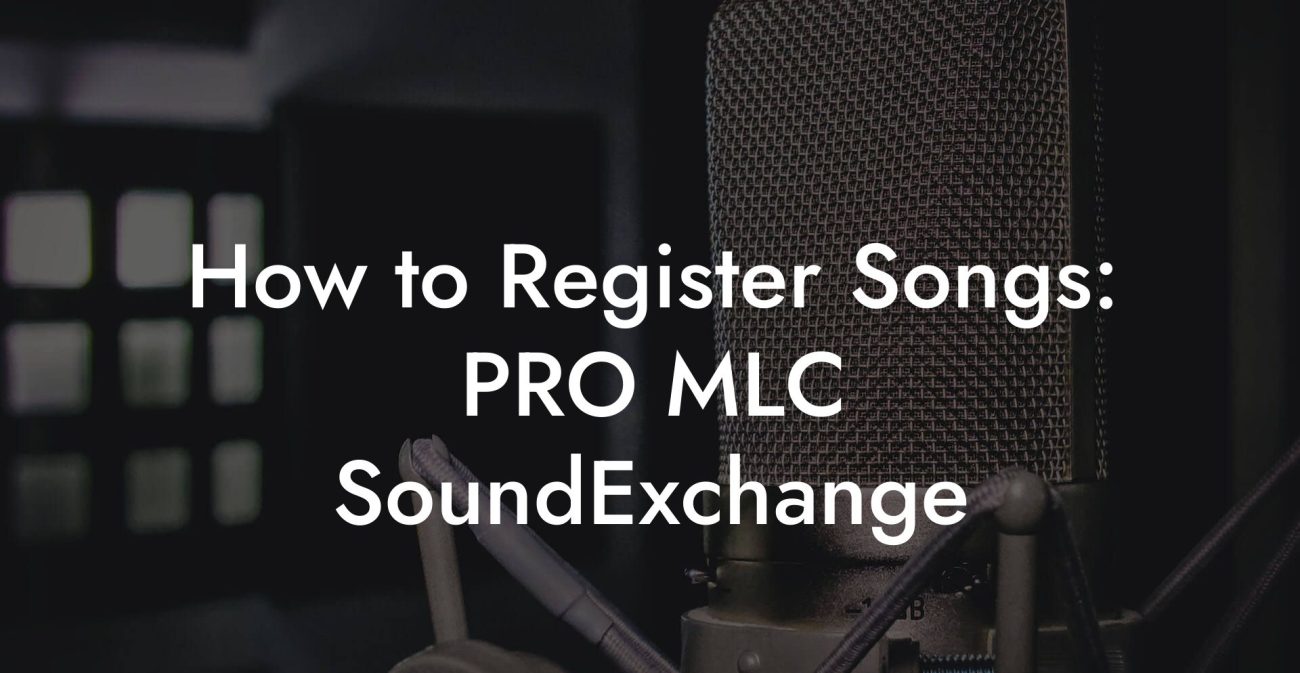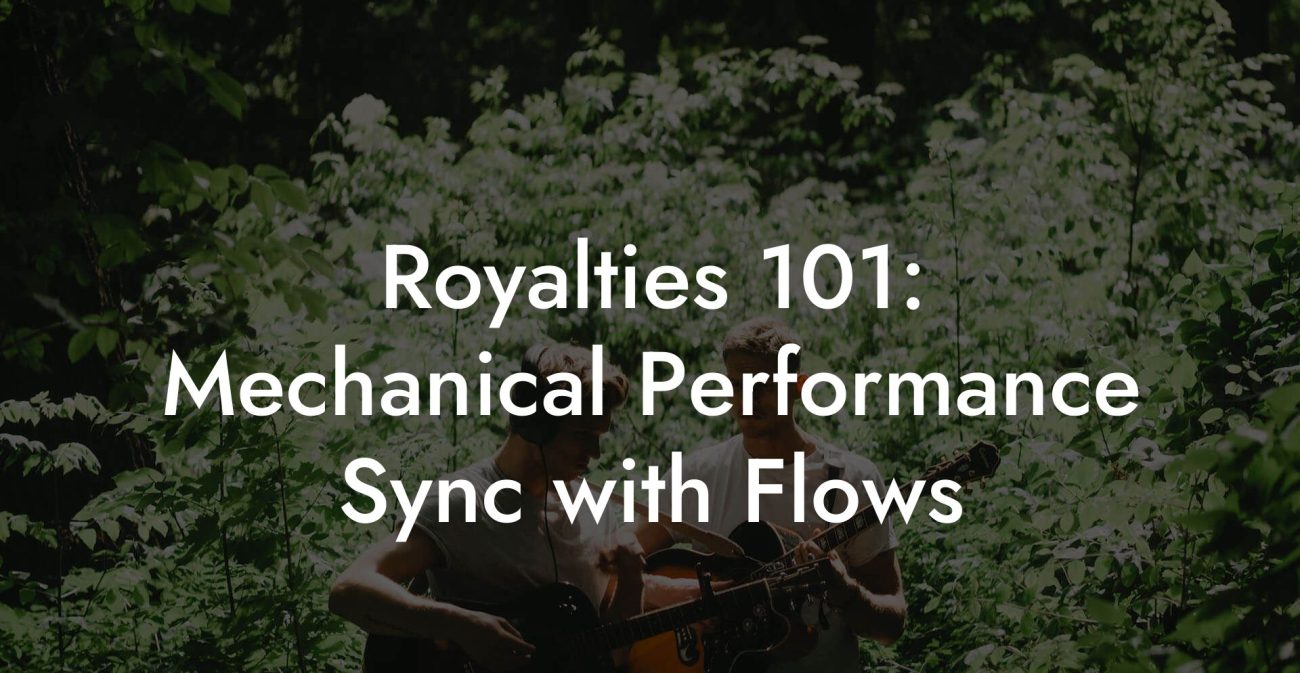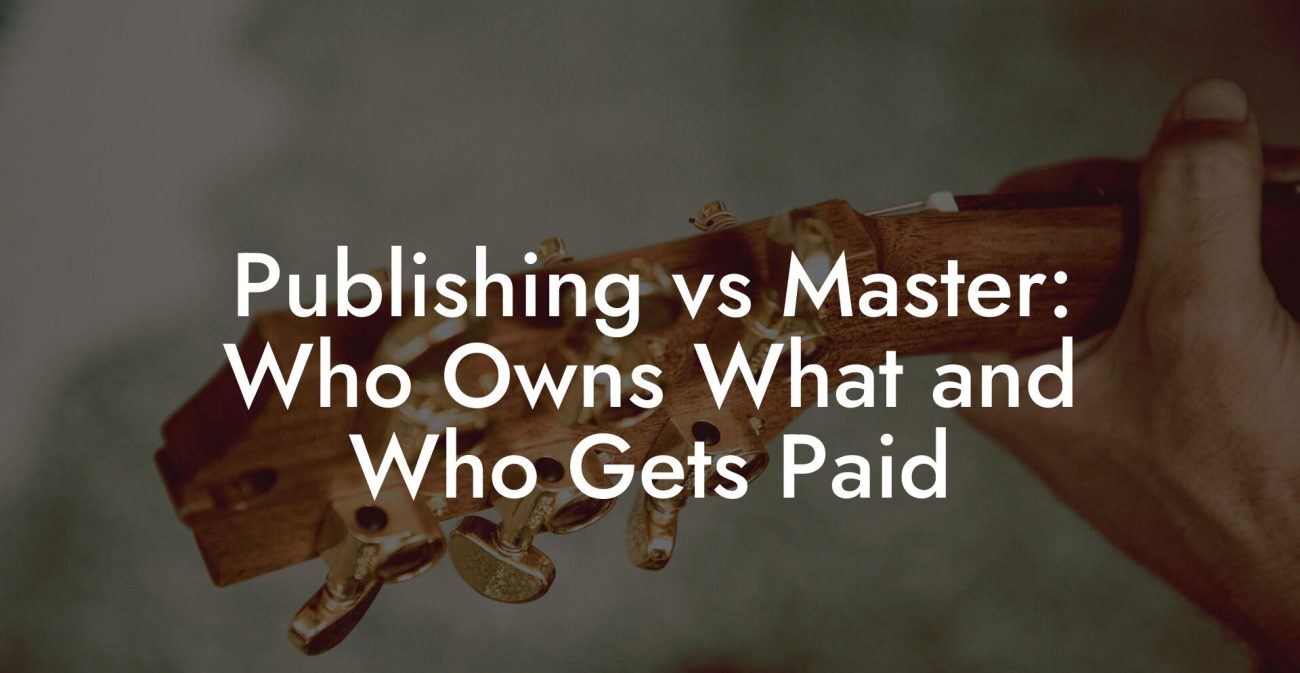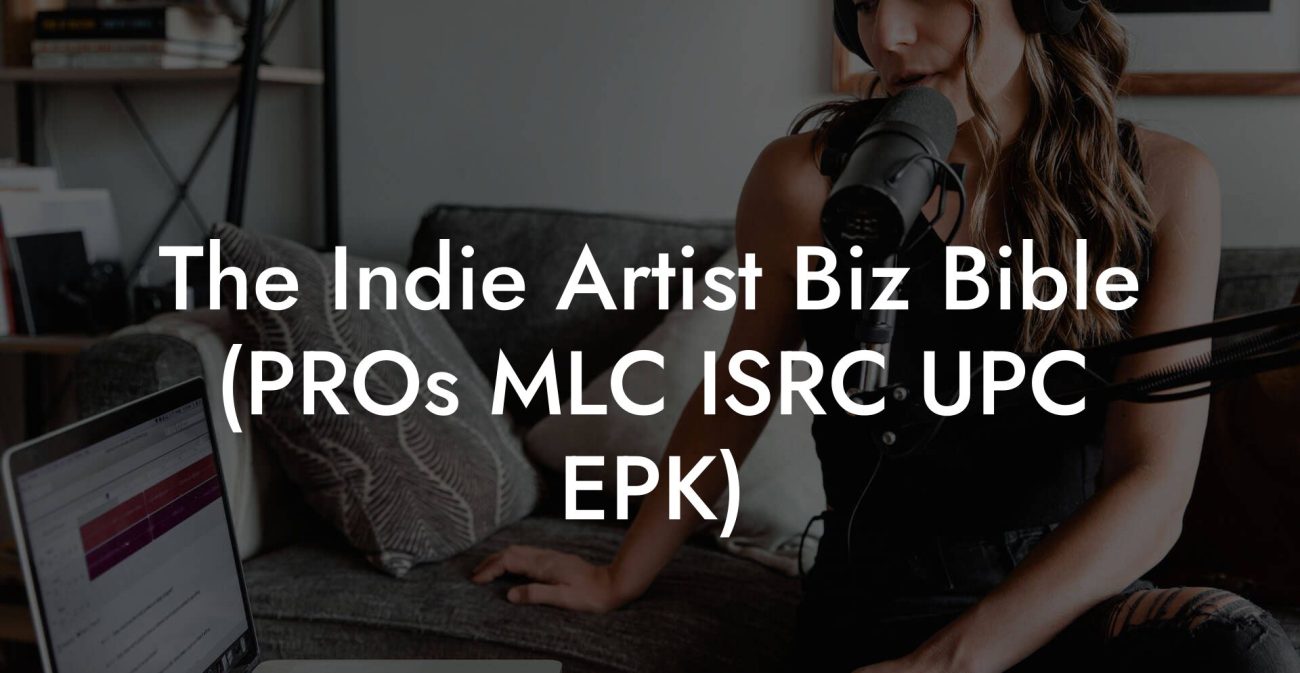Songwriting Advice
Split Sheets Work For Hire and Collab Agreements
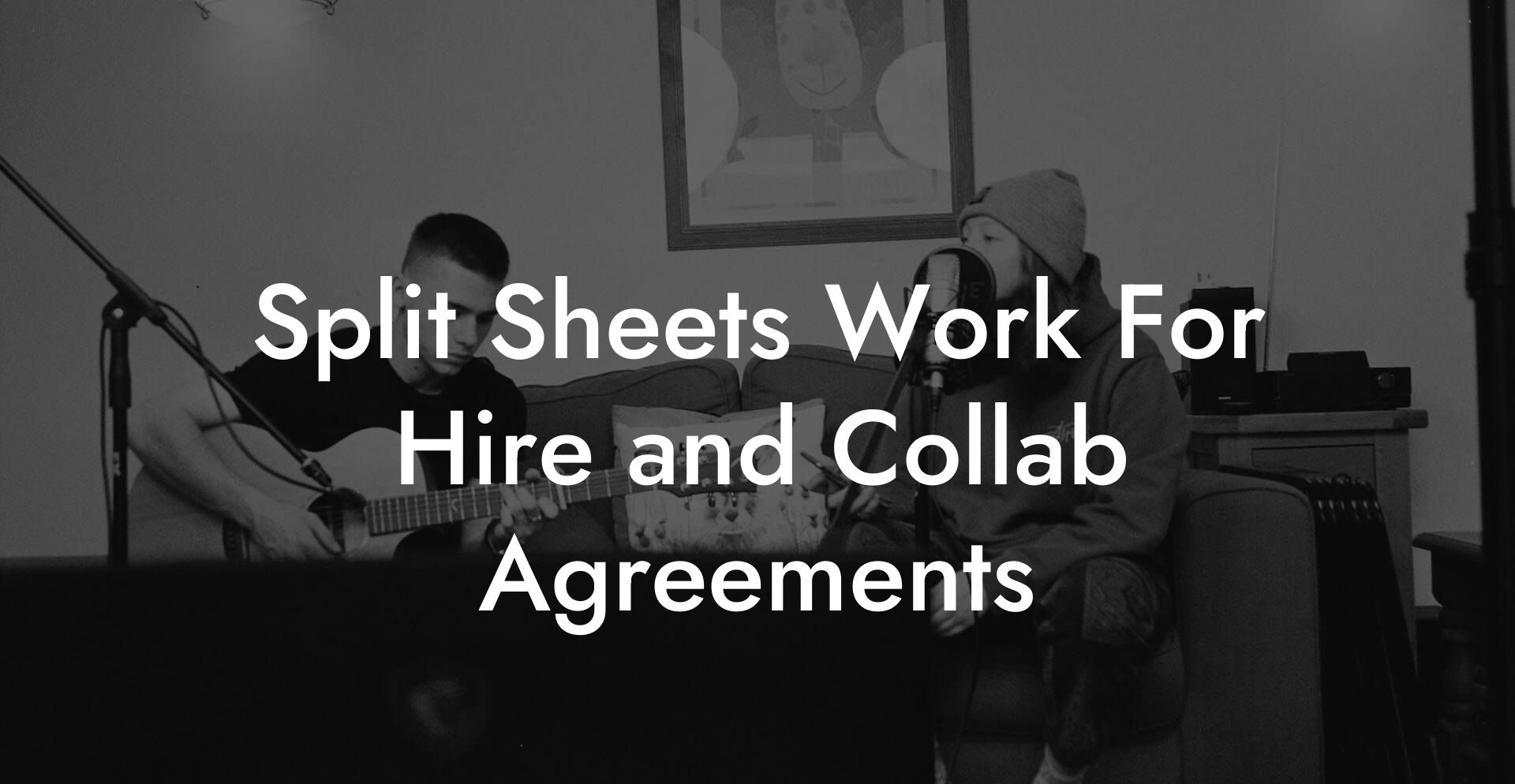
If you make a song with another human being and do not write down who owns what then chaos will find you like bad wifi at a house party. This guide gives you the legal and practical tools to avoid fights text threads and passive aggressive group chats about royalties and credits. You will learn what split sheets are when work for hire applies and how to draft collab agreements that protect you and your sanity.
Quick Interruption: Ever wondered how huge artists end up fighting for their own songs? The answer is in the fine print. Learn the lines that protect you. Own your masters. Keep royalties. Keep playing shows without moving back in with Mom. Find out more →
Quick Links to Useful Sections
- Why this matters more than your Instagram bio
- What is a split sheet
- What goes on a split sheet
- Why split sheets are not sexy and also everything
- Quick real life split sheet scenarios
- Scenario one: The bedroom banger
- Scenario two: The producer and the singer
- What is work for hire
- Two kinds of work for hire you must know
- Why session musicians need clarity
- Collab agreements explained
- Core clauses every collab agreement should include
- Publisher shares and writer shares explained
- How to decide splits in the room
- Split formulas you can steal
- How to fill a split sheet step by step
- PROs and registrations explained in plain language
- Registration workflow after you complete the split sheet
- Producer credits and producer points explained
- Recoupment and advances in collab deals
- Example recoupment clause
- When to use a work for hire clause
- Red flags and common traps
- Negotiation tips that do not suck
- Templates and tools you can use right now
- When you need a lawyer
- Real world examples that make this sticky
- Example A the TikTok earworm
- Example B the hired session guitarist
- Common myths busted
- Actionable session checklist
- Words you must use in agreements and words to avoid
- How to handle changes once a song is released
- Sample clauses you can copy tonight
- Basic split clause
- Work for hire transfer clause
- Producer points clause
- How to register splits with ASCAP BMI and SESAC
- FAQ
- FAQ Schema
This is written for artists producers and anyone who makes music with other people. No lawyer voice. No legalese fog. Just clear steps examples clauses and scenarios you can use tonight after a session when a pizza and a high five feel better than paperwork. Yes paperwork is boring and yes it will save your career.
Why this matters more than your Instagram bio
Music is mostly cash flow that hides in tiny invisible places like streams mechanicals syncs and public performances. If you do not decide who owns those shares now the split will be decided later by guesswork old texts and maybe the worst roommate from college who still drinks your milk. That is why split sheets and collab agreements exist. They turn messy feelings into clean math.
- Split sheets tell the world who gets what percentage of songwriting and publishing.
- Work for hire determines whether the person who created something gave up ownership completely.
- Collab agreements set rules for splits payment recoupment credit and use of the work.
What is a split sheet
A split sheet is a simple document that records who contributed to the song and what percentage of the songwriter share each person gets. Think of it as a receipt for creative contributions. It covers writers and often producers if they contributed to melody or lyrics. It does not replace a full contract but it is the minimum viable paperwork that keeps future fights off the main stage.
What goes on a split sheet
- Song title and working title so everyone knows which track we are talking about.
- Writer names and legal full names so PROs and labels can match them later.
- Role of each person for clarity like lyricist topliner beatmaker or arranger spelled out in plain words.
- Percentage split of the writer share written as whole numbers or percentages that add to 100.
- Signatures and date so it is not just a verbal agreement from a late night session.
- Optional: producer credit and producer split if the producer is getting points on the song royalty pool.
Why split sheets are not sexy and also everything
They are not sexy because they are not a beat drop or a viral hook. They are everything because they prevent suitcases of regret. If your song blows up the streaming math will tell a story. If the math is wrong you will spend more time emailing than making the next hit. Writing down the split at the session prevents that.
Quick real life split sheet scenarios
Scenario one: The bedroom banger
You and your friend made a beat in a dorm room. You wrote the topline melody and the hook. Friend made the drum loop and clap rhythm. No producer credits were discussed. The split should record the writer percentages for melody and beat. If the beat is central decide right away whether producer receives producer points which are a share of royalties rather than songwriter share unless the producer co wrote melody or lyric.
Scenario two: The producer and the singer
A producer gives a chord progression and topline ideas in a session. The singer writes the full topline and lyrics. If both agreed they co wrote the song then the split sheet lists both as writers with the agreed percentages. If the producer says they just made a track and are paid a flat fee then that is work for hire territory. Which brings us to the next big topic.
What is work for hire
Work for hire is a legal concept where the person who hires another person owns the copyright in the work from creation. In music this means the hired person gets paid for a service but gives up copyright ownership in what they created. That sounds simple but the music industry loves blurry lines which is why you must be precise about whether a session is creative collaboration or a hired gig.
Two kinds of work for hire you must know
- Employment work for hire. This applies when someone is an employee and creates work as part of their job. The employer owns the copyright.
- Commission work for hire. This applies only for a narrow list of works and only if a written agreement says it is work for hire. For music this rarely applies unless the parties specifically agree and it fits the categories listed in copyright law.
Practical rule of thumb. If you hire a session musician to play parts and you pay them a session fee often they are not a writer and you own the recording but do not own the composition unless the player wrote melody or lyric. If the player contributed a new melody line then they might be a writer. Always write it down.
Why session musicians need clarity
Session musicians will sometimes add a hook a riff or a bass line that becomes the identity of the song. Legally riffs and hooks can be writers material. If you want the comfort of owning everything pay for it with a clear work for hire clause and be explicit about what rights you are buying in writing. Guessing leads to courtrooms and feelings.
Collab agreements explained
A collab agreement is a deeper contract than a split sheet. It sets expectations for split payments credit licensing rights future uses and sometimes business stuff like merchandising and sync licensing. Collab agreements can be short and simple or long and detailed. The point is to reduce ambiguity.
Core clauses every collab agreement should include
- Identification of parties using full legal names and stage names in parentheses.
- Clear definition of the work being created with working title.
- Writer percentages and how publishing is handled. Publishing means the part of the songwriting income that is often split into two halves. You want to know how that is handled.
- Producer fees and producer royalties if any. Producer points can be a percentage of the net or a flat publishing split.
- Payment terms and recoupment. If someone fronts money how is it paid back from royalties.
- Credit language for how names appear on releases.
- Term and territory for rights meaning how long and where the agreement applies.
- Split sheet attachment and signature block.
- Registration responsibilities with performing rights organizations and music distributors.
Publisher shares and writer shares explained
Songwriting royalties are traditionally split into two equal parts. One part is the writer share and the other is the publisher share. If you own both halves you receive 100 percent of publishing income in practice. Many indie artists own both halves. If you sign with a publisher they often take a share of the publisher side in exchange for services like licensing and admin.
Practical example. Two writers split songwriting 50 50. If neither has a publisher and both own their publisher shares then each gets 50 percent of the writer share and 50 percent of the publisher share which results in equal splits of total publishing. If one writer signs a deal with a publisher that publisher might take 50 percent of that writer s publisher share which changes the flow of money. Write this into the collab agreement so everyone knows what happens if someone signs a separate publishing deal later.
How to decide splits in the room
Do not guess. Use a rule. Common approaches include equal splits flat percentages based on role or value based splits where the hook writer gets more. Whatever you choose write it down the moment the idea forms. The best practices are honesty speed and documentation. If you wait until the song streams one million times relationships will be strained and you will lose sleep and maybe dignity.
Split formulas you can steal
- Equal split. Everyone who contributes to melody or lyric shares equally. Simple and fast for small teams.
- Role weighted split. Example writers 60 percent producers 20 percent beat maker 20 percent. This is fair when roles are distinct.
- Contribution percentage. Each contributor offers a percentage they think reflects their input and the group negotiates until numbers add to 100.
- Hybrid. Equal split for writing then separate producer points paid from the recording revenue not the publishing pool.
How to fill a split sheet step by step
- Write the final song title and any working title variations so the file matches your project folder.
- List each contributor by legal name and stage name. Legal names match PRO accounts.
- Record the specific role for each contributor for clarity. Roles prevent later arguments about what the person actually did.
- Agree percentages so the total equals 100 and write the math clearly. Use numbers not phrases.
- Date and sign. If someone is not present get an electronic signature and save a timestamped email.
- Photograph or scan the split sheet and upload it to a shared drive or project folder with the stems and session files. Keep backups.
PROs and registrations explained in plain language
PRO stands for performing rights organization. These are companies that collect performance royalties when songs are played on radio streamed live performed in public or broadcast. The main US PROs are ASCAP BMI and SESAC. If you are outside the US there are similar organizations per country. Register your splits with your PRO because they pay based on what is registered.
Key terms
- ISRC stands for International Standard Recording Code. It identifies a sound recording release and helps track recordings for digital platforms.
- ISWC stands for International Standard Musical Work Code. It identifies the composition meaning the song itself separate from the recording.
- Mechanical royalties are payments for reproduction of the composition. Streaming platforms pay mechanical royalties through agencies or direct deals.
- Performance royalties go to writers and publishers when the song is played publicly. PROs handle collection and distribution.
Registration workflow after you complete the split sheet
- Each writer registers themselves and their share with their PRO. This means adding the song and the agreed percentages. Do this quickly because registrations can take weeks to process.
- Label or distributor registers the recording with the distribution platform and applies the ISRC code.
- If there is a publisher they register the work with relevant collection agencies and mechanical rights organizations.
- Keep the split sheet in your records and share it with anyone who needs it like the label or publisher.
Producer credits and producer points explained
Producer points are a share of the revenue from the master recording not the songwriting publishing side unless the producer also co wrote. Points are usually applied as a percentage of net receipts or a share of specific revenue streams. Producers who also write melody or lyric receive songwriting credit and thus publishing splits. Make this clear in the collab agreement so the producer knows whether they are earning points publishing a flat fee or both.
Recoupment and advances in collab deals
If someone fronts money for recording promotion or manufacturing then that money is often recoupable. Recoupable means the money is paid back out of future royalties before splits are paid. Say a friend pays for mixing and charges recoupment. The agreement should state how recoupment affects splits and whether recoupment reduces writer shares or recording income only. Be specific. Vagueness here causes bitter group chats.
Example recoupment clause
This is a sample in plain language you can copy and modify. Each payment made by the label or by any party for recording mixing mastering or promotion is recoupable from recording income only. Recoupment will be shared pro rata among owners of the master until recoupment is satisfied. Songwriter splits remain unchanged by recoupment unless all parties agree in writing.
When to use a work for hire clause
Use work for hire when you want to buy ownership of the composition or recording outright. This is common for jingles custom songs and some commissioned work. Be careful. In some places work for hire has legal limits. Always put the words work for hire in a written agreement and be explicit about which rights transfer to the hiring party.
Red flags and common traps
- Verbal agreements after drinks. Writing matters even if you trust the person.
- Changing splits retroactively without signatures. Bad idea unless everyone signs again.
- Assuming a beat maker is not a writer. If the beat carries melody or topline elements they might be a writer.
- Failure to register with PROs. If you do not register properly you do not get performance income even if you own 100 percent on paper.
- Signer confusion. Make sure the person signing is the same person registered with the PRO or publisher.
Negotiation tips that do not suck
- Put splits on the table early. Ask at the top of the session who expects what. Honesty beats passive aggression.
- Offer provisional splits. Say we will tentatively set splits to X and Y and finalize before release. This keeps momentum and reduces post session fights.
- Pay immediate fees for service only work. If you are hiring a player offer a session fee and a separate optional credit rather than ambiguous promises.
- If someone contributed a single line that turned the song into gold consider bonus payments or a small publishing slice. Money solves many feelings.
- Use a neutral third party like a manager to mediate split debates when trust is low.
Templates and tools you can use right now
There are free split sheet templates available from music rights organizations and sites. Your phone can record a signed PDF after the session. Use a cloud folder and name files with the song title date and the word splits so you can find it next time you need it.
Practical tool list
- Split sheet template PDF that lists names roles percentages and signatures.
- Short collab agreement template with the clauses listed earlier.
- PRO registration checklist for ASCAP BMI or SESAC and international equivalents.
- Recording log that stores stems session files and the final split sheet.
When you need a lawyer
Most small sessions do not require a lawyer. But get one when you see money above a threshold a catalog sell off offers a major sync opportunity or a label wants exclusive rights. Lawyers help negotiate complex publishing deals splits trusts and long term rights transfers. Think of them as expensive seat belts that stop you from flying into a legal guardrail at 80 miles per hour.
Real world examples that make this sticky
Example A the TikTok earworm
You made a 10 second topline that went viral on TikTok. The snippet contains your lyric and melody and a producer made the beat. A company offers a sync license for the full song. Because you registered the split sheet early and you are registered with a PRO the license payment lands in the right accounts without drama. Without the split sheet the sync team might pay out to a label or aggregator and then you chase unpaid writer income.
Example B the hired session guitarist
A guitarist records a riff for your song for a session fee. Later the riff becomes the hook. The guitarist says I want points. If your original agreement said session fee with no writing credit you own the recording but the guitarist could still argue the riff is a composition contribution. Clear work for hire or a written transfer of rights would have avoided the conflict.
Common myths busted
- Myth I can fix splits later. Truth Fixing later is expensive and messy. Decide upfront.
- Myth Small streams do not matter. Truth Small streams add up and metadata mistakes compound over time.
- Myth If we are friends we do not need paperwork. Truth Friendships are not legal records and human memory is terrible after tequila.
Actionable session checklist
- Before you start ask everyone who is expected to write or produce today to show ID and PRO registration names.
- Agree on songwriting percentages in the room. Write them on a split sheet and have everyone sign.
- Decide whether producers receive points a flat fee or publishing. Put it in writing.
- Decide if the session is work for hire and get a signed transfer if it is.
- Scan and upload the split sheet and text the link to everyone in the session.
- Register the song with your PROs within days not months.
Words you must use in agreements and words to avoid
Use clear words like transfer assign license percent publisher writer share life of copyright worldwide and irrevocable if you mean it. Avoid vague phrases like we will decide later or fair share which mean different things to different people and lead to arguments.
How to handle changes once a song is released
If you need to change a split after release do it with a written amendment signed by everyone. Update PRO registrations and notify distributors and labels. Expect admin fees and delays. If a new writer is added because of a sampled section or interpolation make sure the split sheet reflects that new person and that the sample is cleared with the original owner.
Sample clauses you can copy tonight
Basic split clause
The parties agree that the composition titled [insert title] shall be owned by the writers in the following proportions writer A [insert percent] writer B [insert percent] writer C [insert percent] The total shall equal 100 percent. Each party shall register their share with their performing rights organization.
Work for hire transfer clause
To the extent permitted by law the undersigned assigns and transfers all right title and interest in and to the musical composition and any lyrics created as part of this engagement to the commissioning party as work for hire. The commissioning party shall own all copyrights in the composition. The undersigned waives any moral rights to the composition to the fullest extent permitted by law.
Producer points clause
The producer shall receive [insert percent] of net master royalties from the sale license and exploitation of the master recording. Producer points shall be payable after recoupment of any agreed recording costs as set forth in this agreement.
How to register splits with ASCAP BMI and SESAC
Each PRO has a song registration portal. The steps are similar. Create the song entry add songwriters and publisher information upload the split sheet if required and submit. Make sure the percentages you enter equal the split sheet. If not the PRO will reject the registration or worse pay the wrong people. If you are outside the US check your local collection society and follow their registration process.
FAQ
What is the difference between a split sheet and a collab agreement
A split sheet is a quick record of who wrote what and the percentage of ownership. A collab agreement is a full contract that covers payment recoupment credits licensing use and other business terms. If you want speed use a split sheet. If you want long term clarity use a collab agreement.
Can a split sheet be changed later
Yes but only with a signed written amendment by all parties. Update PRO registrations and notify distributors. Expect administrative delays and possible disputes if someone objects.
If I pay someone a session fee do I automatically own the composition
No. Paying a session fee does not automatically transfer composition rights unless there is a written agreement that the work is work for hire or that the player assigned their rights. If the session player contributes melody or lyrics they may be a writer unless they signed an agreement to the contrary.
Do I need to register with a PRO to get paid
Yes registration with a performing rights organization is required to collect performance royalties. Mechanical royalties and sync fees may be collected through other channels but PRO registration is essential for public performance income.
What if someone refuses to sign a split sheet after a session
Do not release the song. Try mediation. If the person refuses negotiate a buyout or adjust credits accordingly. Releasing without the signature risks disputes and claims later. Pause until you have written agreement or legal advice.
Are producer points the same as publishing
No. Producer points are usually a share of master recording income. Publishing relates to the composition. If a producer also co wrote the song they may have both producer points and publishing shares.
How do I fix a mistake in PRO registration
Contact your PRO with the corrected split sheet and documentation. Each PRO has a process for adjustment. It can take time and may require agreement from the other writers.

